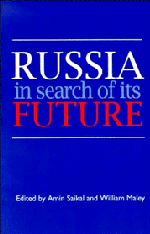Book contents
- Frontmatter
- Contents
- Preface
- Notes on Transliteration
- 1 Introduction
- Politics
- Economics
- 4 The Shape of the Russian Macroeconomy
- 5 Reforming Russian Agriculture: Privatisation in Comparative Perspective
- 6 Privatisation of Large-Scale Russian Industry
- International Relations
- Culture and Society
- Conclusion
- Notes on contributors
- Index
5 - Reforming Russian Agriculture: Privatisation in Comparative Perspective
Published online by Cambridge University Press: 03 May 2011
- Frontmatter
- Contents
- Preface
- Notes on Transliteration
- 1 Introduction
- Politics
- Economics
- 4 The Shape of the Russian Macroeconomy
- 5 Reforming Russian Agriculture: Privatisation in Comparative Perspective
- 6 Privatisation of Large-Scale Russian Industry
- International Relations
- Culture and Society
- Conclusion
- Notes on contributors
- Index
Summary
You have to look the truth in the face: without the modernisation of the machinery and tractor pool in Russian agriculture there's no future at all. However paradoxical it may sound, without such technology there is not even the hope of survival.
For all the talk of the importance of changing property Relations–that is, privatization–as the solution to the accumulated disasters of Russian agriculture, in the short term at least, the simple home truths conveyed by the above quotation from a recent survey of problems with the 1993 harvest are worth keeping in mind. While the theoretical and practical-legal issues connected with the destruction of the old, centralised collective and state farm system and its replacement with various forms of private agriculture are certainly deserving of major attention and will occupy the major part of this chapter, it is necessary to address as well some of the more mundane questions currently facing the Russian Government as it strives to become self-sufficient in food production. Agricultural subsidies and the import of foodstuffs continue to account for a huge share of Russia's budget deficit, and it is becoming increasingly recognised that food self-sufficiency is an essential component of any program of general economic reform. It is perhaps the one area where import substitution makes good economic sense–however much such an argument may distress Australian trade officials.
- Type
- Chapter
- Information
- Russia in Search of its Future , pp. 66 - 84Publisher: Cambridge University PressPrint publication year: 1994



